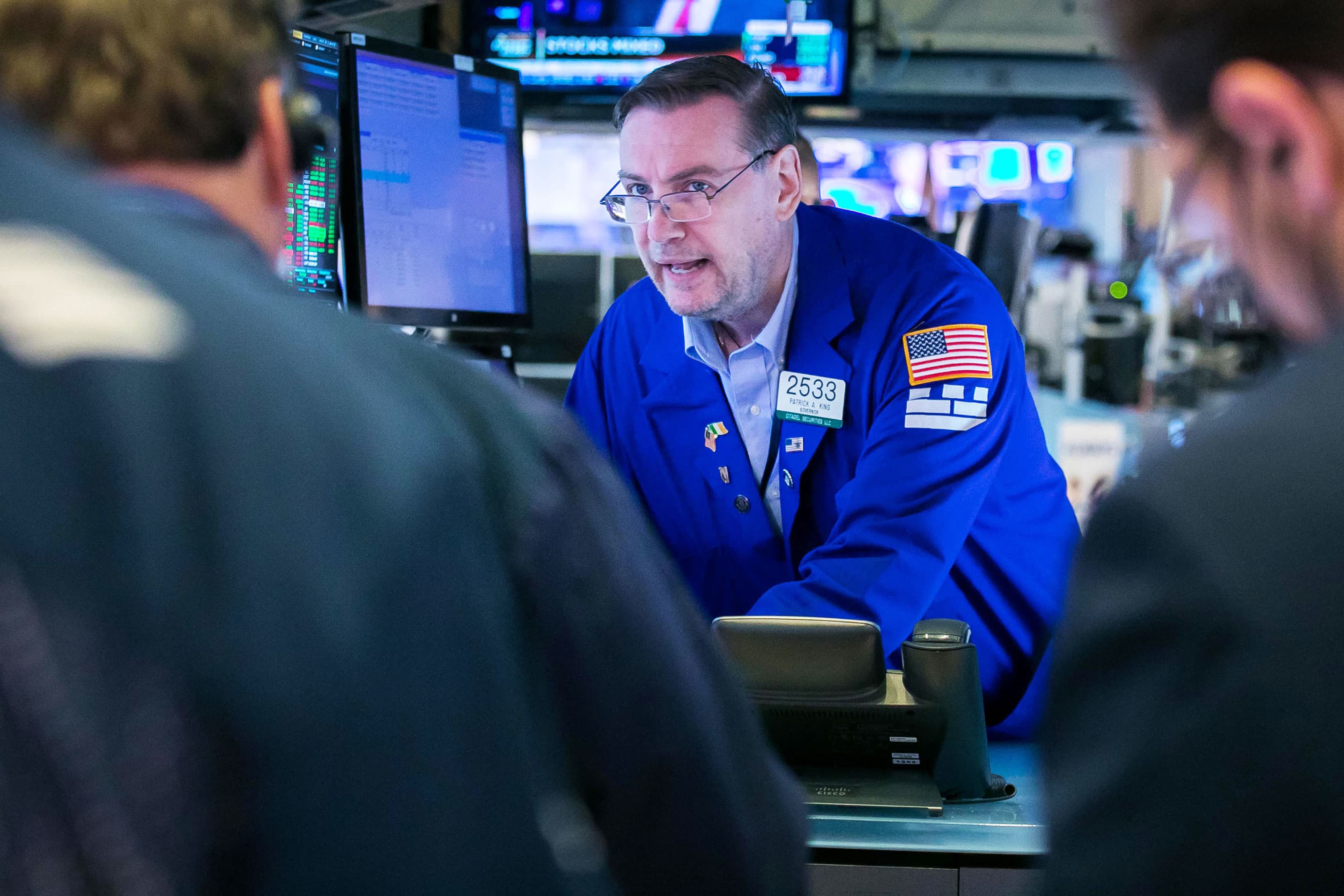The morning sell-off in stock futures is accelerating with Dow futures now down 500 points

U.S. stock index futures fell aggressively on Monday on concern a rebound in Covid-19 cases would slow global economic growth. The selling in futures increased as the morning progressed with Dow Jones Industrial average futures now down about 500 points.
Stocks that would most directly benefit from a continuing swift reopening of the economy led the losses in premarket trading with shares of Royal Caribbean and United Airlines falling more than 4%. The 10-year Treasury yield fell to a new 5-month low of 1.219%, amid concerns about a possible slowing in the economy.
Futures contracts tied to the Dow dropped 500 points, or 1.2%. S&P 500 futures fell 1.2%. Nasdaq-100 futures shed 1%.
“Consumer concern about inflation as well as a rise in new cases of Covid-19 among vaccinated Americans could weigh on consumer sentiment in the coming months even as employment and incomes grow as the economy re-opens,” Oppenheimer chief investment strategist John Stoltzfus said in a report Monday.
Covid cases have rebounded in the U.S. this month with the delta variant spreading among the unvaccinated. The U.S. is averaging nearly 30,000 new cases a day in the last 7-days ending Friday, up from a 7-day average of around 11,000 cases a day a month ago, according to CDC data. Cases were already flaring up around the world because of the delta variant.
United and American Airlines shares lost 5% in premarket trading. Delta fell about 4%. Along with shares of cruise lines and airlines, key stocks linked to the global economy pulled back in premarket trading. Caterpillar, Boeing and General Motors all lost about 2%.
“The market appears ready to take on a more defensive character as we experience a meaningful deceleration in earnings and economic growth,” wrote Mike Wilson, Morgan Stanley’s chief U.S. equity strategist, in a note Monday. “Market breadth has been deteriorating for months and is just another confirmation of the mid-cycle transition, in our view. It usually ends with a material (10-20%) index level correction.”
Wilson is advising clients to buy staples such as Mondelez International to weather the decline.
Oil prices fell on fears of slowing growth and as OPEC+ agreed to begin phasing out production cuts. Energy stocks were among the worst performers in premarket trading with ConocoPhillips off by more than 3%. Exxon Mobil lost 3%. WTI crude shed 3% to about $69.36 a barrel.
A busy week of earnings is on deck, with nine Dow components set to report and 76 S&P companies will provide quarterly updates. United Airlines and American Airlines will report, as will social media companies Snap and Twitter. CSX, Johnson & Johnson, Coca-Cola, Honeywell, IBM, Intel and Netflix are also on the docket.
“We’ve been in this trading range…this rotational market — value to growth, growth to value,” said Stephanie Link, chief investment strategist and portfolio manager at Hightower, on CNBC’s “Squawk Box” Monday. “I think we’re kind of in this pattern until we can hear from companies.”
The largest banks kicked off earnings season last week, and analysts at BMO noted that ahead of the start to earnings season 66 companies in the S&P 500 issued positive earnings guidance for the quarter, which is the largest since at least 2006.
“Q2 earnings season is here and another stellar reporting period is expected for US stocks with the S&P 500 y/y EPS growth rate currently sitting at 65.5%, which would mark the strongest clip since Q4 ’09,” the firm said in a recent note to clients.
The Dow and S&P fell 0.52% and 0.97% last week, respectively. The Nasdaq Composite, meanwhile, was the relative underperformer, dropping 1.87%, to post its worst week since May. It was the major averages first negative week in four.
Inflation fears weighed on stocks last week, with a U.S. consumer sentiment index from the University of Michigan released on Friday showing that consumers believe prices will jump 4.8% over the next year. This is the steepest climb since August 2008. Earlier in the week, the June Consumer Price Index showed that inflation jumped 5.4% year-over-year, spooking investors.
On the economic data front, the National Association of Home Builders will release its latest survey results on Monday, giving consumers a glimpse into sentiment across the housing market. Economists polled by Dow Jones expect the reading to be unchanged from the prior month at 81. Anything above 50 is considered positive sentiment.
For the month of July, the Nasdaq Composite is down 0.5%. The S&P 500 and Dow are in the green, however, rising 0.7% and 0.5%, respectively. The Russell 2000 is down more than 6% amid weakness in small caps.
Become a smarter investor with CNBC Pro.
Get stock picks, analyst calls, exclusive interviews and access to CNBC TV.
Sign up to start a free trial today




